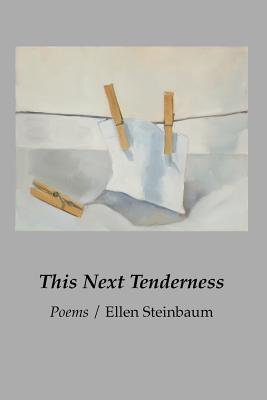Interview and Selected Poems from ellen Steinbaum
Off the Coast is proud to introduce our new interview series, where we correspond with a writer about their latest book.
This Next Tenderness, published this year by CW Books, was written by former Off the Coast contributor Ellen Steinbaum. Steinbaum is the author of four poetry collections, and her work has been nominated twice for the Pushcart Prize. An award-winning journalist and former Boston Globe columnist, she writes a blog, “Reading and Writing and the Occasional Recipe,” which can be found at her website, ellensteinbaum.com. Her books can be ordered from her site and from Amazon.
A.E. Talbot: This is your fourth poetry collection. At what point of the writing process did you know you had another book here?
Ellen Steinbaum: With this one I was a little surprised to see that there seemed to be a body of poems ready and eager to become a book. That happened with my second book, too, but with the two others I had obsessed enough over the poems to be aware the minute a collection seemed to have taken shape.
A.T. Do you consider your latest book to be in conversation with your earlier work?
E.S. I sometimes think they talk behind my back. My poems grow so specifically out of my engagement with the world—both the larger world and my immediate personal one—that it feels like a continuous conversation over time, evolving and changing, but coming out of the same set of attitudes, experiences, preferences, etc.
A.T. Whether or not they draw from your real life, these poems feel very personal. Was there a poem that was especially hard to write—technically, emotionally, or in terms of time?
E.S. They do draw from my life, though with the caveat that, in poetry, truth does not always mean fact.
Though some poems have come easily, I have found many others hard to write for all those reasons. The ones in my first book were written around the illness and death of my late husband, so, obviously, many of those presented emotional challenges. And my third book was written at a point when my life took an unexpected turn and I met the man I am now married to.
In terms of technical difficulty, some poems take me a very long time to figure out how they want to be written. I usually begin writing on paper, but at some point I transfer to the screen and I appreciate the way it’s so easy to try different shapes, line lengths, stanzas.
A.T. You’ve also written a one-person play, CenterPiece. Has your experience writing the play influenced your poems?
E.S. Again, I think all my work is pretty much of a piece. In fact, the play contains several poems from my first book. I don’t know that writing the play influenced my poetry, but there is certainly a relationship between performing it and reading my poems to an audience. I love doing readings—as I loved doing my play—with that sense of immediate connection to the audience. And it always make me feel grateful when people open themselves to the work.
A.T. How do you understand your role as a member of your artistic community?
E.S. I feel particularly connected to visual art and quite a few of my poems have started with a painting or photograph or sculpture I’ve seen.
A.T. What’s your favorite under-appreciated book?
E.S Her work is far from under-appreciated, but when someone tells me they don’t read poetry or they want a way into poetry I tell them to read Linda Pastan’s work. It is accessible and yet profound and beautiful.
A.T. If you had to characterize this book in a sentence (impossible, I know), how would you describe it to readers?
E.S. In a time of turmoil and harshness I am finding myself moved to view the world-- public and private—with a kind of tenderness…with the knowledge that we have to live seeing the flaws but also searching for what brings us peace and allows us to act with compassion.
Selected poems from This Next Tenderness
This Next Tenderness
The way he does it is
when the soap melts down to a sliver, he
pancakes it to the new bar—good and good,
more and more, like and like. And the way
she does it is
she drops the thin scrap onto the shower drain
to wash away, takes a fresh cake from the drawer,
weighs the heft and smoothness in her hand. That too,
she calls it cake, he calls it bar--vanilla/chocolate,
no right, no wrong, only an unhurried drift
as the passion to merge transforms into
a sanctity of differences, not black/white but
softer, maybe blue/green or shades of taupe
with borders opened out, enfolding both
builder of cairn and discarder of shard, marking
sacred ground for savoring of this, of that.
Covert Negotiations
Assumptions have been made;
this has been the case for years:
clothes bought to fit your size and shape,
nails filed and whiskers shaved
as if you owned them,
a conceit of hardiness,
of strength that you could count on
and meanwhile (meanwhile, that
insidious betrayer) you were the host
to secrets: a bargain taking place
without your knowledge or consent.
The Sacrament of Soup
This is what you do
when the call comes:
take the largest pot from the shelf
pour in water
chop and scrape
chop and scrape
carrots turnips
anything you have
any amount
add without measuring
lentils split peas marrow bone
anything you have
any amount.
Set it over fire.
This is what you do:
take the largest pot from the shelf
let your hands begin the work
let the fire begin the work
watch the incantation
of bubbles rising
again and again
fire
water
scrape
chop
anything you have
again and again.
This is all you can do.
